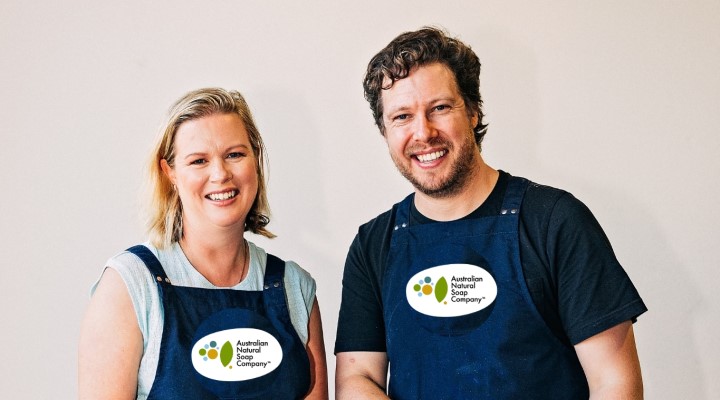Emma Cook and her husband are the founders of the Australian Natural Soap Company (ANSC), a business that has experienced a growth spike since their decision to pivot to online for their sales and marketing. We spoke to Emma, whose brother Ben works for the company as Operations Manager, about the reasons behind the shift and its outcome.
ISB: What was the inspiration behind the launch of the ANSC, and when and where did the business launch?
EC: I previously worked as a video journalist for SBS, travelling to all corners of Australia. I then went on to become a speechwriter for the Department of Foreign Affairs and Trade, where I wrote about why Australia needs to focus on niche manufacturing in agriculture and natural produce. Those experiences made me very passionate about Australian ingredients.
Meanwhile, my husband was a doctor in emergency departments. After using very strong antibacterial soaps in the hospital setting, he needed something really gentle to use at home but the commercial soaps available were only making his skin worse.
We started looking for natural soap alternatives, but they all had palm oil in them. I was already very aware of the palm oil problem, having lived in Indonesia and seen the devastation first-hand. With my husband as the chemist and me the researcher, we started experimenting, making soap with Australian plant oils. When our friends and family started asking for more of our soaps, we thought we might have a business.
ISB: What makes your products stand out from those of your competitors?
EC: We get a lot fewer laughs now when we say that a well-formulated bar of natural soap can take the place of any cleansing or cleaning product that you currently use – even that very expensive jar of facial cleanser. In the 1980s, everyone was using soap bars but these days 75 per cent of us use plastic-bottle wash.
“Being clear on what we stood for, and no longer wanting to be just another skincare brand, going online allowed our brand to take on its own unique personality.”
It often blows people’s minds when I tell them that the plastic bottle that they’ve been told is OK because it is recyclable has only a 13 per cent chance of being recycled in Australia and only a one per cent chance of being recycled twice. If we want to win the war on waste, then we need to start thinking differently about what a skincare product is, and to fall in love with the humble soap bar once more.
I, and a growing number of our customers, believe that a good natural soap bar is much better than any skincare product. We use Australia’s finest plant oils (olive, avocado macadamia, etc) and pure, steam-distilled essential oils, made with our unique slow-set cold-pressed process that ensures the integrity of these ingredients makes it into your bathroom. We have customers in their 70s saying their faces have never looked so good because of the oils that we use.
We also offer soaps for hair, laundry, shaving and even dogs. Our soap boxes can be home-composted, and our liquid soaps come in glass and tin refills.
ISB: What was your original business model when you launched?
We began very humbly making our products in our kitchen, so a big chunk of our time in the early years was scaling our manufacturing capabilities in a way that maintained the unique way that we made our soaps. Like many product-based small businesses, we probably spent too much time perfecting the product rather than focusing on our sales and marketing. We grew quite a fanbase at South Melbourne market, where we opened our first shop, and within a year of launching, we were contacted by a distributor and Myer to stock our products, and started supplying some big retailers overseas.
These early wins were a testament to the quality of our products. But it’s fair to say that we stumbled into the wholesale and export side of the business. COVID hit soon after, and my team and I didn’t have the experience to work with big retailers.
ISB: And how did that model change when the retail recession started to bite?
EC: When the retail landscape began to change and we were no longer the ‘new shiny thing’, our growth stalled, so we underwent a rebrand. Apart from revamping our packaging, it cleaned up our product architecture and forced us to do some deep thinking about why we do what we do.
As a part of the rebrand, we built a new website, re-platforming to Shopify. From that point, eCommerce became my obsession. Being clear on what we stood for, and no longer wanting to be just another skincare brand, going online allowed our brand to take on its own unique personality and also have that direct communication with our customers, who really wanted to engage with us and support what we do. We were no longer just a soap on the shelf in a store competing with other soaps on a shelf in a store, we were now offering people a lifestyle change – being able to make the switch from plastic bottle wash to a much better product for the skin and the planet.
With some mentoring, I took over all our digital marketing. As the founder, I am always going to be the most passionate about my products and the most able to motivate people to make the switch to soap-based skincare. I also took over community management – dealing with the good and the bad things people say online helps me be a better marketer, product developer, etc.
ISB: How has that shift in business model affected your revenue?
EC: Not long ago, eCommerce accounted for 35 per cent of our business – that figure is now 80 per cent. We are trading 250 per cent up, year-on-year, online and regularly hitting six-figure months. I’m still amazed at how quickly we have been able to scale online, which I put down to having very solid foundations with our branding and product mix – and most importantly our ‘why’. Getting your digital marketing right also flows through to other sales channels.
ISB: How do you see ANSC growing and developing in the next couple of years?
EC: All our focus is on eCommerce now – we feel we have only scraped the surface of what we can do online. We are also working to expand internationally again, but this time we’ll do so through our own eCommerce channel, rather than relying on a distributor. I’ve always believed that ANSC would appeal to overseas markets and we believe that we will now be able to draw on all the lessons we have learnt from scaling here in Australia.
Another area of growth for us is in the gifting space, where we collaborate with Australian artists for the packaging. Our first was our Australian Bush Range, with artwork by Ikuntji artist Daphne Marks. The artwork is stunning and Daphne gets 15 per cent of every product sold. It’s been an opportunity for us to introduce soaps that use native Australian essential oils, such as Kunzea and Rosalina, that rival some of the more well-known overseas like lavender and lemongrass. These have become our best-sellers in gifting and we are looking to do two more collaborations with artists this year.
This article first appeared in issue 44 of the Inside Small Business quarterly magazine
















